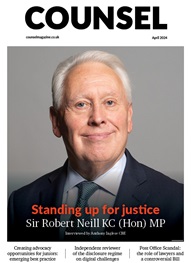*/
Legal aid
Lord Neuberger has spoken out on the impact of cuts to legal aid in civil cases, which come into effect on 1 April.
The Supreme Court President took the unusual step of embarking on a series of media interviews last month. He spoke widely of the threat to the rule of law, arising from denying legal aid to over half a million people: “[P]eople will feel like the Government isn’t giving them access to justice in all sorts of cases,” he told the BBC. “And that will either lead to frustration and lack of confidence in the system, or it will lead to people taking the law into their own hands.”
Lord Neuberger added that the increase in litigants in person would lead to longer court hearings, with greater burdens on court staff and judges: “And you may find the savings the Government thinks it’s making in legal aid will be offset in other costs of courts and judges and court staff in supporting litigants in person,” a point also forcefully made by the Lord Chief Justice in his final annual evidence to the House of Lords Constitution Committee in February.
Under the Legal Aid, Sentencing and Punishment of Offenders Act 2012, the Government has removed funding from private family cases (apart from those involving domestic violence, forced marriage or child abduction); clinical negligence and personal injury; employment and education; as well as social welfare law, including benefits, housing, education and debt.
The Ministry of Justice, meanwhile, has thrown a lifelife to the Citizens Advice Bureau at the Royal Courts of Justice, which faced closure after Community Legal Service grants were cut. The Ministry will be providing £90,000 to support its family justice work from 1 April.
The Supreme Court President took the unusual step of embarking on a series of media interviews last month. He spoke widely of the threat to the rule of law, arising from denying legal aid to over half a million people: “[P]eople will feel like the Government isn’t giving them access to justice in all sorts of cases,” he told the BBC. “And that will either lead to frustration and lack of confidence in the system, or it will lead to people taking the law into their own hands.”
Lord Neuberger added that the increase in litigants in person would lead to longer court hearings, with greater burdens on court staff and judges: “And you may find the savings the Government thinks it’s making in legal aid will be offset in other costs of courts and judges and court staff in supporting litigants in person,” a point also forcefully made by the Lord Chief Justice in his final annual evidence to the House of Lords Constitution Committee in February.
Under the Legal Aid, Sentencing and Punishment of Offenders Act 2012, the Government has removed funding from private family cases (apart from those involving domestic violence, forced marriage or child abduction); clinical negligence and personal injury; employment and education; as well as social welfare law, including benefits, housing, education and debt.
The Ministry of Justice, meanwhile, has thrown a lifelife to the Citizens Advice Bureau at the Royal Courts of Justice, which faced closure after Community Legal Service grants were cut. The Ministry will be providing £90,000 to support its family justice work from 1 April.
Legal aid
Lord Neuberger has spoken out on the impact of cuts to legal aid in civil cases, which come into effect on 1 April.


Sam Townend KC explains the Bar Council’s efforts towards ensuring a bright future for the profession
Giovanni D’Avola explores the issue of over-citation of unreported cases and the ‘added value’ elements of a law report
Louise Crush explores the key points and opportunities for tax efficiency
Westgate Wealth Management Ltd is a Partner Practice of FTSE 100 company St. James’s Place – one of the top UK Wealth Management firms. We offer a holistic service of distinct quality, integrity, and excellence with the aim to build a professional and valuable relationship with our clients, helping to provide them with security now, prosperity in the future and the highest standard of service in all of our dealings.
Is now the time to review your financial position, having reached a career milestone? asks Louise Crush
If you were to host a dinner party with 10 guests, and you asked them to explain what financial planning is and how it differs to financial advice, you’d receive 10 different answers. The variety of answers highlights the ongoing need to clarify and promote the value of financial planning.
Most of us like to think we would risk our career in order to meet our ethical obligations, so why have so many lawyers failed to hold the line? asks Flora Page
If your current practice environment is bringing you down, seek a new one. However daunting the change, it will be worth it, says Anon Barrister
Creating advocacy opportunities for juniors is now the expectation but not always easy to put into effect. Tom Mitcheson KC distils developing best practice from the Patents Court initiative already bearing fruit
Sam Townend KC explains the Bar Council’s efforts towards ensuring a bright future for the profession
The long-running fee-paid judicial pensions saga continues. The current cut-off date for giving notice of election to join FPJPS is 31 March 2024, and that date now gives rise to a serious problem, warns HH John Platt